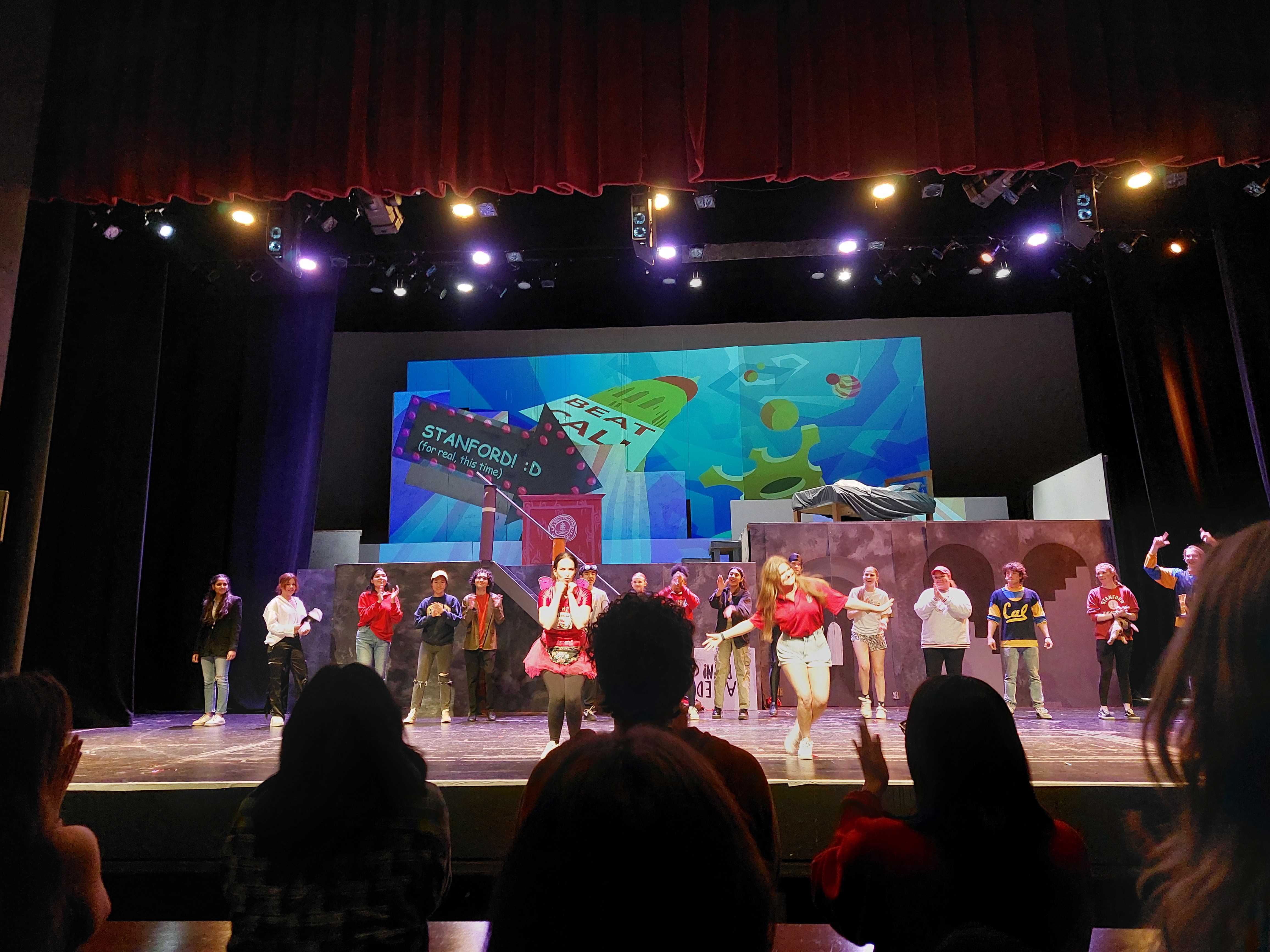On Wednesday, Thursday and Friday of Big Game Week, Stanford students gathered in Memorial Auditorium for one of the most anticipated theatrical performances of the year — Gaieties 2022. Complete with hilarious Stanford jokes, romance and recent headlines such as William Curry and the ‘Stanford Hates Fun’ protests, “Cardinal Sin” did not disappoint.
The Show
As the curtain is drawn, four devious Cal students are revealed. Their mission? Banish all the Stanford students to hell so they can’t make it to the Big Game. Clever, yes. But will it work?
After a few lines of gibberish, the Devil (Skye Lyles ’25) emerges. She states that one good Stanford student is enough to save the Cardinal from eternal damnation. The show that follows is a trial in which two students — Mo (Sheruni Pilapitiya ’26) and Davina (Jae Sobers ’25) — are accused of dormcest and banished to hell. As the friends and lovers journey through the layers of hell, they learn how to build healthy friendships and be true to themselves, all while having comical encounters (such as convincing an athlete to break up with her backpack).
Both Mo and Davina played relatable young adult characters. Mo wanted to fit in and give in to peer pressure, while Davina had to overcome self-obsession and overconfidence to be able to support her friends.
The Devil, played by Lyles, was truly the star of the show. Her powerful solos, firm dialogue and confident gait combined to create an intimidating and mighty character. Other notable demonstrations of talent included the truly excellent tap dancing by Taylor (Mack Jones ’26) and Backpack (Henry Cargill ’26), as well as charming musical compositions reminiscent of a Disney-Broadway mix.
However, there were clear coordination problems with ensembles: some dance numbers were out of sync, and the presence of multiple simultaneous storylines in the first act derailed continuity.
Two highlights of the show turned out to be the show’s main traditions: the cameo of Stanford President Marc Tessier-Lavigne as the god of Stanford Heaven and the “Naked Run.” Tessier-Lavigne’s dialogue was drowned out by the audience chanting “Stanford Hates Fun,” which eventually led to him proclaiming “Thou shalt have fun.” As for the latter, people did naked cartwheels; now that requires some next-level confidence.
Throughout the performance, whenever two characters (or even a character and an object) shared the stage in close proximity, audience members would yell “Make out!” / “Hug!” / “Kiss!,” so much so that the Devil started calling out to the audience with improvised dialogue: “Who keeps shouting ‘make out’? Girl, that’s for Friday.” This spontaneity led to increased audience engagement and made the show more enjoyable overall while showcasing the acting talent of the Devil.
The plot was strong throughout, except for a slight drag in the middle. The ending, with the characters’ discovery that there was no Stanford student free from sin, was anticlimactic but wholesome. “You all suck,” the devil confirmed. Yet, she continued, “the thousands and thousands of Stanford students added together do make one good person.” So, in a joyous turn of events, the Stanford students make it out of hell and to the Big Game.
The Experience
Upon entering Memorial Auditorium, students were met with a comprehensive list of audience agreements. The numbered list included “I will not enter the Gaieties if I am black out [drunk],” and “I will not scream ‘Make Out!!!!’ excessively during the show.” As sober observers, we dubiously repeated the bullet points.
The theater vibrated with the din of early 2000s anthems. Girls sang, shimmied and screamed down from the balcony, while boys made gorilla sounds and roared. Friday’s “Row Night” was especially filled with rowdy, light-hearted banter and had an audience of fraternities, a cappella groups, sports teams and beyond. Unfortunately, the same noisy audience paired with poorly executed sound design made large parts of the dialogue difficult to hear.
Each night of the Gaieties served its purpose. Frosh Night introduced newcomers to the bizarre world of Stanford (and theater) by breaking the previously held stereotypes that recent high school graduates might harbor about their “dream university”; Press Night kept the Big Game hype afloat despite many Stanford-specific jokes not hitting home with the audience; Row Night gave upperclassmen a chance to unwind post-midterms and to vent their frustrations through mockery and humor.
Still, Gaieties fails as a safe space for all; audience peer pressure continues to put actors in uncomfortable positions and compromise the flow of the intended story. Especially on Frosh Night, the gaudiness of the humor was visibly uncomfortable and borderline inappropriate, making the viewing experience awkward at times.
The Takeaway
In the end, “Cardinal Sin” was by no means a refined theatrical masterpiece. It was at its heart a comedic take on the academic and social culture at a hyper-competitive university. While several attendees remarked that this year’s event was tamer compared to past ones, the chaotic school spirit certainly did not seem muted to first-time participants. The music, the dancing, the sketchy humor and the surprise cameos all served as tools to bring out the raucousness and immaturity unexpected of a typical Stanford student.
At Stanford, the pressure to be outstanding permeates student life. The absurd assumption of intellectual performance was put away for just a few hours at Gaieties — one of the university’s few spaces where mistakes are not criminal. Jokes flopped, and people cheered their friends on anyway. Community was fostered in the show, baking satire into the kitschy skits. Most importantly, the narrative revealed something fundamental about every student in attendance: that they were now part of a large, imperfect family, and that it is completely possible to find a sense of belonging in it while staying true to oneself.
Editor’s Note: This article is a review and includes subjective thoughts, opinions and critiques.
